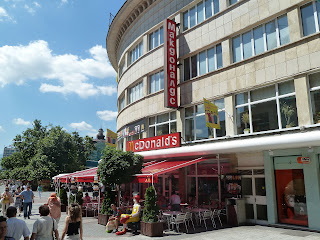The rain was coming down in sheets. The street was a muddy mess. Playing outside wasn’t going to happen today. Staring out the window, still, I was coming to terms with a good summer day wasted. Drip, drip! The rhythmic splashes on the window sill cut my daydreaming short and brought a tune into my head:
It’s raining outside.
Drip, drip, drop!
We have to play inside.
I sang my little song to Mom. She didn’t care much, nor she knew how to write sheet music, so I settled for writing the words into a notebook.
I began writing poetry because my parents would not support my interest in composing music, and poetry was the closest to music. I wrote about 50 poems between the age of 10 and college. Many got lost and college hit the pause button on my writing. Boys became the poetry.
Recently, I selected twelve poems from what was saved and self-published them on Amazon. I simply had to do it for my 10-year-old self.
When I first re-read my poetry from 40 years ago I was blown away by a realization. As much as I love the big city now, I grew up a countryside child. Perhaps it is because I grew up in the slow-lane countryside that I had the time to observe my surroundings, to develop curiosity for what else is out there, to get inspired to write.
Amazon rejected my book at first. My native Bulgarian was not among the 46 supported languages. I translated my poetry into English to accompany the originals so I could publish them. The illustrations were drawn by children of ages similar to mine at the time of writing the poems, and they came from around the world. The title is an homage to my first-ever poem - Rain. A Dutch boy drew a green field and snow-capped mountains hovered by clouds. It is raining and there is a bright yellow flash in the middle of the rain, connecting the clouds and a mountain top. The book cover features this drawing on a yellow background, my favorite color.
It takes patience to write a book, even if it’s only a dozen pages and self-published. It takes strong attention to detail visually and solid proofreading. It takes creativity to translate rhymes. But the hardest of all was the wait for Amazon’s acceptance of my bilingual book. If they had said no, I would have found another way to let my poetry see the world. Because it is an inspiration to recognize and nurture creativity, a reminder for anyone young and old to follow their passions.
I have read that creatives sometimes let fear of success get in the way of putting themselves out there. I thought I was immune to it, but when all the text, the illustrations, and the cover were carefully combed, reviewed, and uploaded, my heart skipped a beat before I pushed the “publish” button. Butterflies in my stomach whispered, “What now?” My inner child replied, “Life goes on.” I smiled.
Within 48 hours of sharing on social media that I had published a book, I collected hundreds of hearts and dozens of congratulations. My 10-year-old self was jubilant!
“We write to taste life twice, in the moment and in retrospect.” said Anais Nin. Publishing an old writing double-folded on that idea for me - I reconnected with my child-self and made both her and myself happy. How am I dealing with it all? I guess life goes on and I won't let anything rain on it.





.png)



